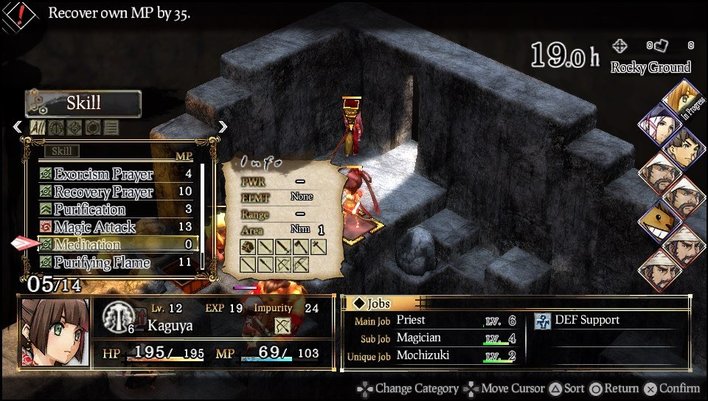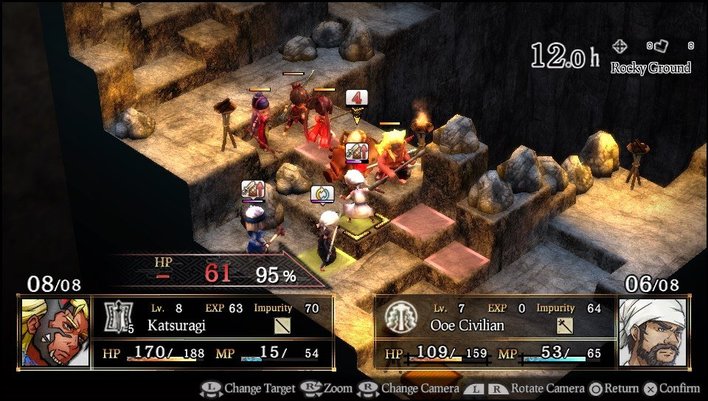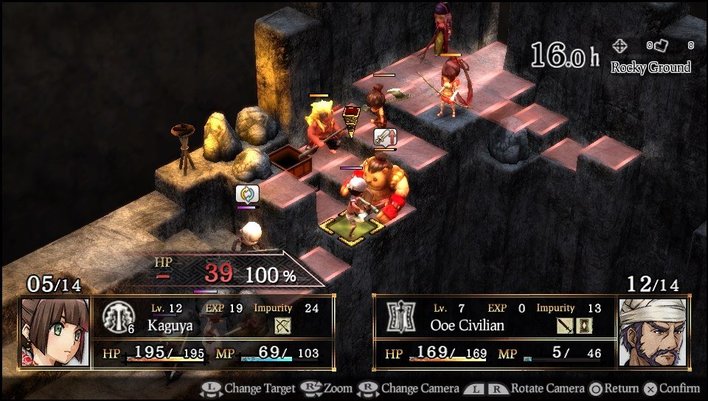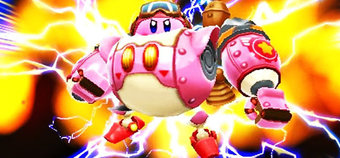A bunny girl, a demon, a bear, and a princess who's been held as a backup sacrifice for the first 13 years of her life walk into a battle. No, it's not the most elaborate set up to a joke ever, but rather a cross section of the slightly bizarre cast of God Wars: Future Past, a game that's steeped in ancient Japanese folklore, but thankfully stops short of saying it's based on battles that actually took place in ancient Japan.
Available on the PS4 or PS Vita, God Wars is a turn-based, grid based, isometric strategy role playing game by Kadokawa Games - the team who previously bought us the intensely hard Natural Doctrine, and, er, the visual novel Root Letter. Building on its experience with the former (whilst seemingly completely forgetting the latter), God Wars is a game that intends to deliver a slightly easier turn-based battling experience - although that's not to say this is a game without depth. If anything, it still has too much.

All must wait while the Grand Spider takes his illustrious turn
The story here's set in a land wrought by natural disasters. Having upset the delicate balance between nature and the elements, a series of terrible events have occurred, from earthquakes and storms to volcanic eruptions and floods. Worried about the health of her citizens, the good Queen does what any concerned ruler would do, and promptly chucks her eldest daughter into the nearest volcano as an offering to the gods, before locking her youngest away as a backup. You know, just in case sacrificing your first born isn't enough to appease the volcano. Fast forward 13 years, and with the world plunging further into turmoil, her younger daughter, Kaguya, who's now fully grown, manages to escape during a riot thanks to a little help from her childhood friend, Kintaro. Setting out on an adventure together, the duo embark on a quest to discover just what's gone wrong with the world, and how they can put it right.
What follows is a fairly standard turn-based strategy game, where you'll move from story mission to story mission, with a few optional stop overs at some shrines to take on some side-missions in between. Playing out in a traditional fashion, the battles here are fairly cookie cutter for a strategy role playing game, pitting your tiny, rag tag bunch of misfits against a much larger, and often more powerful foe, with the only thing standing between you and a certain defeat being your immense brainpower. As per tradition, you'll take it in turns with characters on the other team to both move and attack or use a skill, with the turn order shown in a handy bar at the right. Skills run the gamut from magical attacks and healing spells, to slightly more invested physical attacks - like Heavy Blow, which lets you deal much more damage, but has a much lower chance of actually connecting. Skills in turn cost you MP (or magic points), of which each character has a surprisingly limited amount - so you'll need to choose wisely.

The more powerful your spell, the more MP it'll use, too, giving you an even harder choice
As with so many strategy games, positioning is particularly important in God Wars, as it actively plays into how much damage you can do. Rather than being totally flat, each stage usually contains a variety of heights of terrain, with attacking from a height advantage, or nipping round the side or rear of your opponent, letting you deal more damage, and giving you a handy accuracy boost. Of course, the boosts work both ways, so you'll want to be sure you maintain a healthy distance between you and your foes.
Rather than dividing characters into specific classes, God Wars: Future Past instead uses a job system, which you can change at any time. The longer each character sticks with their job, the more Job Points they'll earn, which in turn can be spent on unlocking new moves, and upgrading the ones they already own. Each character can actually have three jobs at any one time. The main job not only lets that character unlock its associated skills, but it also determines how their stats will shape up as they level up; the secondary job is for skill unlocking only; while the third job is a character exclusive job, gaining you access to a whole host of character exclusive powers.

Nothing you do is final until you actually choose your attack, letting you preview different positions and moves to see what works, and what doesn't.
But while the job system is a nice enough idea, it's also all a bit of a faff, as you're never entirely sure when you have enough Job Points to spend on an upgrade, and having to navigate the game's often slow to respond menus in between each battle quickly grows to be a bit tiresome. Needless to say, it's also a bit intimidating too, as without anything to really explain what each job does, and how it'll affect your character in ways that are easy to understand, you'll often end up just leaving things how they are, in case you make a mistake.
God Wars itself can tend to be a bit of a grind fest, too. If you try to simply play through the story missions on their own, you'll very quickly find yourself coming a cropped when you reach the first semi "boss" fight, as, despite having finished every other mission up until now, you'll find the boss can kill you in just two hits - and he has about a dozen helpers who can finish the job before it gets round to being his turn again. It turns out you're actually not technically meant to be able to rush into the boss fight in the first place anyway, as instead, what you'll need to do is head to the nearest shrine, where you can take on half a dozen sub-missions first, which will give your characters the experience they need to level up, and give you much more than a fighting chance against the boss. The only problem is, the game doesn't tell you you need to do that, making the learning curve feel a bit bumpy to say the least.

Archers are great, as they have an impressive range - especially when they have a height advantage
But perhaps the biggest issue we have with God Wars is in the translation, and the story. Some of the English here is unusually bad, with characters having conversations that often make very little sense, which in turn makes the plot - something which is always incredibly important in a role playing game - hard to follow at best. With dialogue regularly verging into "what the heck are they talking about" territory, and some really poor English throughout, even in the tutorials (like "Jumping over 1 space takes 2 Jump" or "For Mid Row selects weapons and armor that focus on ATK and EVD. For Back Row focuses on MATK and MDEF"), it's fair to say this is a translation that seems to have been rushed through, which in turn makes us worry about the upcoming Danganronpa 3...
With a fairly robust battle system, an overly complex job mechanic, and a story that verges between nonsensical and totally confusing, it's fair to say that God Wars: Future Past has plenty of room for improvement. Held together through the strength of the fairly standard battle system alone, this is a long way behind the Fire Emblems and Disgaeas of the day, but one that fans of turn based strategy games may want to keep in mind - just don't expect too much from the plot.
Format Reviewed: PS Vita




















